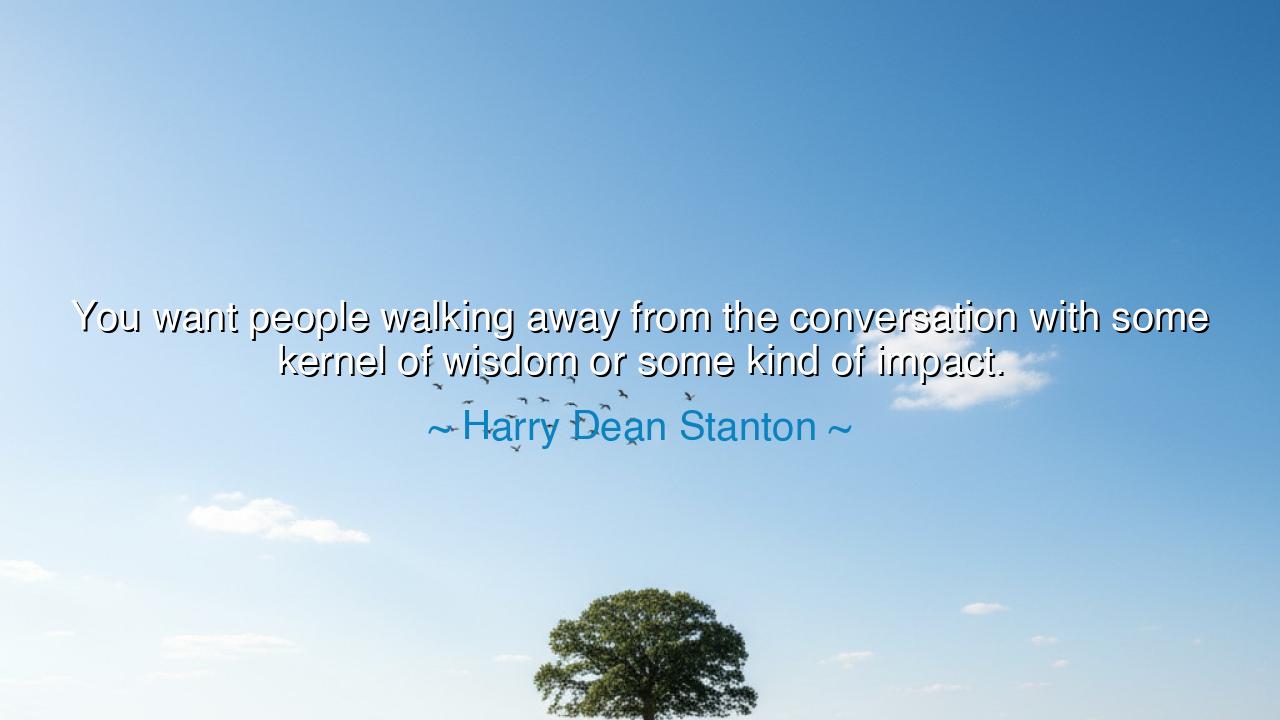
You want people walking away from the conversation with some
You want people walking away from the conversation with some kernel of wisdom or some kind of impact.






Harry Dean Stanton, the quiet sage of cinema, spoke with simplicity yet with depth: “You want people walking away from the conversation with some kernel of wisdom or some kind of impact.” In these words lies the essence of meaningful speech: that words are not meant to vanish like smoke, but to plant a kernel of wisdom in the heart, small at first, but capable of growing into strength and remembrance.
The meaning is plain yet profound. To speak idly is to waste breath; to speak with care is to leave behind something that endures. Stanton reminds us that every conversation is a chance to shape another soul, even if only with a spark of insight, comfort, or truth. The wise do not strive to overwhelm with many words, but to leave one word, one phrase, one impact, that will linger after the voices are gone.
History gives us many such moments. Consider Pericles, whose Funeral Oration in Athens did not seek to explain every detail of war, but left behind a burning remembrance of courage, sacrifice, and the duty of citizens. His speech became a kernel of wisdom carried through the centuries, not because of its length, but because of its impact on the spirit of a people. So too, Stanton suggests, our ordinary words can hold extraordinary power when spoken with care.
This truth also humbles us. For not all will write books, command armies, or carve monuments. But every man and woman speaks, and in speaking may leave behind something that nourishes or wounds. To aim for a kernel of wisdom is to treat language as sacred, to honor conversation as a gift through which souls may be lifted or enlightened.
Therefore, let the seeker remember: every encounter is an opportunity to give more than noise. Do not speak only to be heard; speak to leave an impact. Let your words be seeds, not shadows, for seeds take root in the hidden places and rise long after the speaker is silent. Stanton’s counsel is timeless: that in every conversation, no matter how small, we hold the power to leave behind wisdom that outlives us.






NHNguyen Hai
This statement makes me think about how fleeting most conversations are. We talk so much but rarely reflect on whether our words matter. I like the idea of speaking with purpose, but it also feels like a lot of pressure—to always be meaningful or memorable. Maybe the real power lies not in planned wisdom but in empathy and connection, where people remember how the exchange made them feel rather than what was said.
0D08.Lam Duc
I find this thought both inspiring and challenging. It suggests that communication should aim for meaning, not just exchange. Yet in practice, how do we balance wanting to make an impact without coming across as preachy or self-important? Sometimes the simplest, most spontaneous remarks resonate more than carefully crafted wisdom. I’d love to hear Stanton’s view on whether impact comes from intention or from the emotional truth behind what’s said.
QCquynh chi
This quote really resonates with me. It makes conversation sound like an art form—a chance to plant ideas that linger after the words end. But it also makes me curious: is it even possible to have every interaction leave a lasting impression, or is that an unrealistic expectation? Maybe the goal isn’t to always be profound but to be genuine enough that what you say carries emotional or intellectual weight naturally.
NLPham Ngu lao
I love this perspective—it feels like a call to intentional communication. But I wonder how often people actually think about leaving others with meaning in everyday conversations. In a world full of small talk and distractions, how do we cultivate that kind of presence? Maybe it’s not about profound statements but about authenticity and listening. I’d like to know what Stanton considered a ‘kernel of wisdom’—something moral, emotional, or simply human?